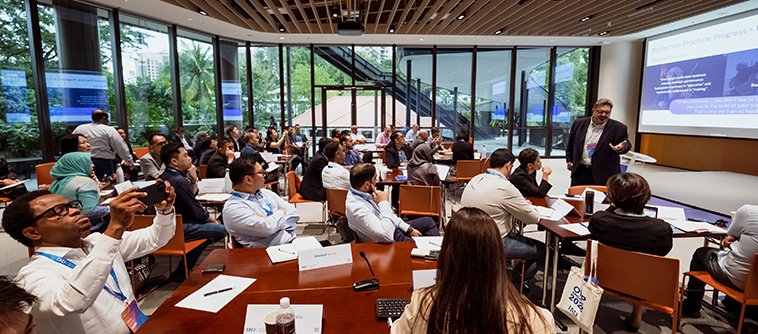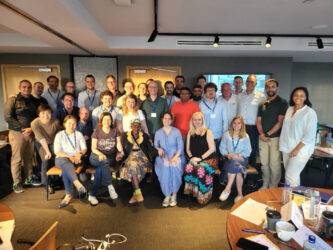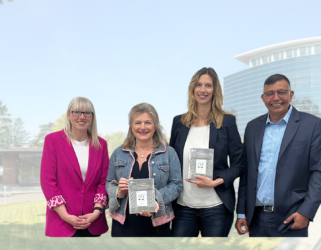On the third day of IMD’s Orchestrating Winning Performance program in Singapore, faculty and participants focused on leadership and the skills that chief executives need to develop.
In the morning, participants learned why leaders find it so difficult to learn.
Jean-François Manzoni, IMD’s President and Nestlé Chaired Professor, used the analogy of children learning to ride a bicycle, first with training wheels and then numerous tumbles until they finally master it.
“They have enormous persistence coupled with a profound desire to master this new skill,” he said.
But, he asked the auditorium, at what age do we stop having these characteristics?
Ideally, the answer is never, he said, but, “if you believe you can change, you are probably right. And if you believe you cannot, you’re also probably right.”
It is key to try and do so.
“Neurons that fire together, wire together. If you exercise your brain in a certain direction for 20 minutes a day for something like eight weeks. We can already see the density of some parts of your brain changing,” he said.
“When people tell you that it’s impossible to change, I think what they really mean is ‘I don’t make the effort to change’”.
He gave participants three ways to improve.
The first is through reflective practice.
“The more you work at it, the more natural it will be for you,” he said.
“Smart people learn from their mistakes, smarter people learn from other people’s mistakes as well,” he added.
The second is mindfulness.
Manzoni highlighted the fact that a study found 47% of the time, people are thinking about something other than what they’re doing. What leaders need to do is to have breaks in their schedules, practice conscious breathing, use mindfulness apps and consider meditation.
“Mindfulness is a superpower,” he said.
The final way, he said, is persistence
“Executives don’t like to fail, but they lose the skills that they had as children that enabled them to learn how to bicycle,” he said.
The insider outsider
Ric Roi, Professor of Leadership and Organization, in his session ‘Your Pathway to the C-Suite: All the Right Steps’, explained how boards should assess and recommend candidates to be chief executives.
The challenge, he said is that “only 12% of the global leaders that we’ve assessed around the world are ambidextrous naturally” – meaning being able to work and reposition today’s core business and then shift to create the new business and revenue models.
The remaining 88% are not ambidextrous, he said.
Focusing on a case study in the telecoms industry, 80% of the company’s business was about traditional mobile telephone services, broadband and cable television, with the remaining 20% coming from new businesses data centers, cyber security services and mobile payments.
Although the company wanted to reverse this, “it couldn’t pivot quickly enough, largely because of culture.”
The company decided to look internally for a new chief executive and the two final candidates were the consumer business head and the chief financial officer (CFO).
The first was what Roi characterized as ‘insider insider’. She had stayed with the company for 13 or 14 years and had spent her whole career in telecommunication, sales and marketing.
“Although ‘insider insiders’ are not always the best, the board is generally more comfortable with them,” he said.
The second candidate is what he called an ‘insider outsider’.
Inside the company but outside the main line of business, Roi described the CFO as “slightly riskier, but the second most common candidate that boards will appoint”.
The overwhelming consensus from participants was to promote the CFO and indeed, Roi revealed, it is what the company did.
From the balcony
Katharina Lange, Affiliate Professor of Leadership, in her session “Leading People as a Coach: Core leadership skills for your future”, talked about how leaders should coach rather than mentor their teams.
Imagine you are attending your best friend’s wedding, she said. After a while, dancing in the center of things, you take a walk to the balcony and have a look at the dance floor. You see your friends having a good time, but at the fringes, people are a little more disengaged. There are even people moving slowly towards the exits.
“You wouldn’t have noticed if you hadn’t stepped onto the balcony. I invite all leaders to go to the balcony,” she said.
A mentor, she explained, helps you to advance certain steps in your career. A coach, on the other hand, “provokes the thought process in your own mind so that you will be able to find the solutions yourself”.
Here, she cited the chief executive of a fast-moving consumer group who makes her team “think through the problems themselves” in the hope that the solution they come up with helps the company.
“This is part of the journey – having the patience and the skill to ask thought-provoking questions,” she said.
“If you’re a leader, building relationships, building bonds and developing the people around you are part of your core assignment,” she said.




